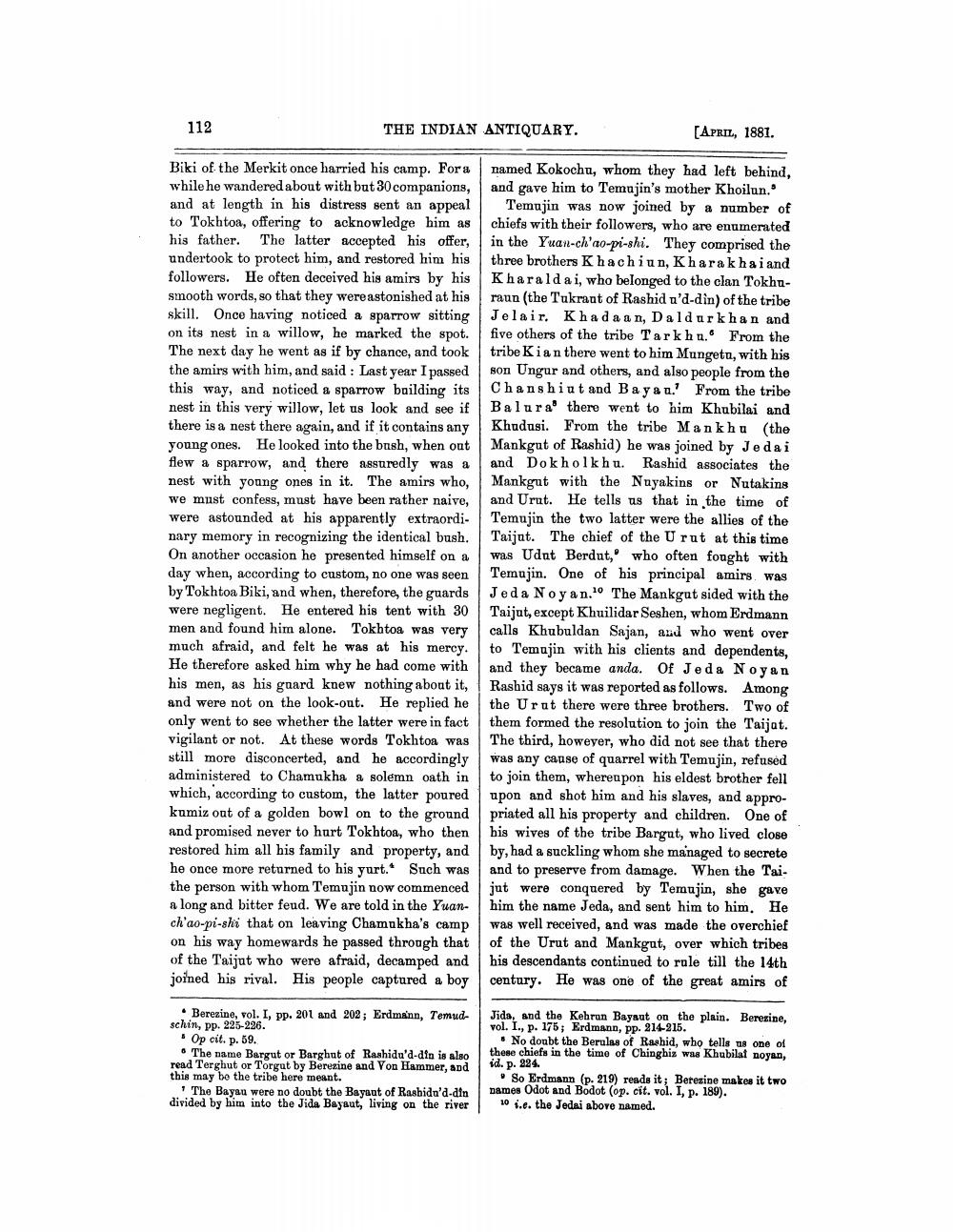________________
112
THE INDIAN ANTIQUARY.
Biki of the Merkit once harried his camp. For a while he wandered about with but 30 companions, and at length in his distress sent an appeal to Tokhtoa, offering to acknowledge him as his father. The latter accepted his offer, undertook to protect him, and restored him his followers. He often deceived his amirs by his smooth words, so that they were astonished at his skill. Once having noticed a sparrow sitting on its nest in a willow, he marked the spot. The next day he went as if by chance, and took the amirs with him, and said: Last year I passed this way, and noticed a sparrow building its nest in this very willow, let us look and see if there is a nest there again, and if it contains any young ones. He looked into the bush, when out flew a sparrow, and there assuredly was a nest with young ones in it. The amirs who, we must confess, must have been rather naive, were astounded at his apparently extraordinary memory in recognizing the identical bush. On another occasion he presented himself on a day when, according to custom, no one was seen by Tokhtoa Biki, and when, therefore, the guards were negligent. He entered his tent with 30 men and found him alone. Tokhtoa was very much afraid, and felt he was at his mercy. He therefore asked him why he had come with his men, as his guard knew nothing about it, and were not on the look-out. He replied he only went to see whether the latter were in fact vigilant or not. At these words Tokhtoa was still more disconcerted, and he accordingly administered to Chamukha a solemn oath in which, according to custom, the latter poured kumiz out of a golden bowl on to the ground and promised never to hurt Tokhtoa, who then restored him all his family and property, and he once more returned to his yurt. Such was the person with whom Temujin now commenced a long and bitter feud. We are told in the Yuanch'ao-pi-shi that on leaving Chamukha's camp. on his way homewards he passed through that of the Taijut who were afraid, decamped and joined his rival. His people captured a boy
Berezine, vol. I, pp. 201 and 202; Erdmann, Temudschin, pp. 225-226.
Op cit. p. 59.
The name Bargut or Barghut of Rashidu'd-din is also read Terghut or Torgut by Berezine and Von Hammer, and this may be the tribe here meant.
The Bayau were no doubt the Bayaut of Rashida'd-din divided by him into the Jida Bayaut, living on the river
[APRIL, 1881.
named Kokochu, whom they had left behind, and gave him to Temujin's mother Khoilun."
Temujin was now joined by a number of chiefs with their followers, who are enumerated in the Yuan-ch'ao-pi-shi. They comprised the three brothers Khachiun, Kharak hai and Kharalda i, who belonged to the clan Tokhuraun (the Tukrant of Rashid n'd-din) of the tribe Jelair. Khadaan, Daldur khan and five others of the tribe Tarkhu." From the tribe Kian there went to him Mungetu, with his son Ungur and others, and also people from the Chanshiut and Bayan.' From the tribe Balura there went to him Khubilai and Khudusi. From the tribe Mankhu (the Mankgut of Rashid) he was joined by Jedai and Dokholkhu. Rashid associates the Mankgut with the Nuyakins or Nutakins and Urut. He tells us that in the time of Temujin the two latter were the allies of the Taijut. The chief of the Urut at this time was Udut Berdut, who often fought with Temujin. One of his principal amirs was Jeda Noyan.10 The Mankgut sided with the Taijut, except Khuilidar Seshen, whom Erdmann calls Khubuldan Sajan, and who went over to Temujin with his clients and dependents, and they became anda. Of Jeda Noyan Rashid says it was reported as follows. Among the Urut there were three brothers. Two of them formed the resolution to join the Taijat. The third, however, who did not see that there was any cause of quarrel with Temujin, refused to join them, whereupon his eldest brother fell upon and shot him and his slaves, and appropriated all his property and children. One of his wives of the tribe Bargut, who lived close by, had a suckling whom she managed to secrete and to preserve from damage. When the Taijut were conquered by Temujin, she gave him the name Jeda, and sent him to him. He was well received, and was made the overchief of the Urut and Mankgut, over which tribes his descendants continued to rule till the 14th century. He was one of the great amirs of
Jida, and the Kehran Bayaut on the plain. Berezine, vol. I., p. 175; Erdmann, pp. 214-215.
No doubt the Berulas of Rashid, who tells us one of these chiefs in the time of Chinghiz was Khubilat noyan, id. p. 224.
" So Erdmann (p. 219) reads it; Berezine makes it two names Odot and Bodot (op. cit. vol. I, p. 189).
10 i.e. the Jedai above named.




